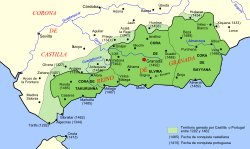Nasrid Kingdom of Granada
| Emirate of Granada | ||||||||||
|
إمارة غرﻧﺎﻃﺔ Imarat Gharnāṭah |
||||||||||
| Tributary state of the Crown of Castile | ||||||||||
|
||||||||||
|
Motto Wa lā ghāliba illā-llāh (There is no victor but God) |
||||||||||
|
Territory of the Nasrid Kingdom
|
||||||||||
| Capital | Granada | |||||||||
| Languages | Official language: Classical Arabic Other languages: Andalusi Arabic, Mozarabic, Berber, Ladino |
|||||||||
| Religion | Majority religion: Islam Minority religions: Roman Catholicism, Judaism |
|||||||||
| Government | Hereditary monarchy | |||||||||
| Sultan | ||||||||||
| • | 1238–1273 | Mohammed I ibn Nasr | ||||||||
| • | 1487–1492 | Muhammad XII | ||||||||
| Historical era | Late Middle Ages | |||||||||
| • | Established | 1230 | ||||||||
| • | Castilian conquest | 1492 | ||||||||
|
||||||||||
| Today part of |
|
|||||||||
The Emirate of Granada (Arabic: إمارة غرﻧﺎﻃﺔ, trans. Imarat Gharnāṭah), also known as the Nasrid Kingdom of Granada (Spanish: Reino Nazarí de Granada), was an emirate established in 1230 by Mohammed I ibn Nasr. After Prince Idris left Iberia to take the Almohad leadership, the ambitious Mohammed I ibn Nasr established the last Muslim dynasty on the Iberian peninsula—the Nasrids. The Nasrid emirs were responsible for building the Alhambra palace complex as it is known today. By 1250, the Emirate was the last part of the Iberian peninsula held by the Muslims. Andalusian Arabic was the mother tongue of the majority of the population. For two more centuries, the region enjoyed considerable cultural and economic prosperity.
With the Reconquista in full swing after the conquest of Córdoba in June 1236, Mohammed I ibn Nasr aligned Granada with Ferdinand III of Castile in 1246, thereby creating a tributary state, or taifa, under the Crown of Castile. Granada remained a tributary state for the next 250 years, with Nasrid emirs paying tribute to Castilian kings mostly in the form of gold from present-day Mali and Burkina Faso that was carried to Iberia through the merchant routes in the Sahara. The Nasrids also provided military assistance to Castile for its conquest of areas under Muslim control, most notably Seville in November 1248 and the Taifa of Niebla in 1262..
...
Wikipedia



